Is Composite Toe Better Than Steel Toe For Electricians?
Yes, Composite Toe work boots are better for electricians for many reasons. Here I will provide an overview of both types so you can make an informed decision on your next pair of boots!
OSHA requires proper PPE and steel-toe boots are a critical part of that. Not only are safety toe boots critical for safety compliance they are basically another tool in your toolbox, only this tool is made to keep you safe. Steel toe boots have long been regarded as the go-to shoe for any job involving electricity because they offer superior protection against impact, compression, and puncture resistance. Steel toes were also first on the scene but now there are more choices including composite toe, alloy toe, and more.
Table of Contents
- Can Electricians Wear Steel Toe Boots
- Recommended Electrician Boots
- What Kind Of Boots Should Electricians Wear?
- Composite Toe Pros And Cons Electricians
- Steel Toe Pros And Cons Electricians
- Are Steel Toe Boots Conductive?
- What Are The Risks Of Steel Toe Shoes For Electricians?
- Do Safety Toe Boots Count As PPE?
- Best Manufacturers For Work Boots For Electricians
- Best Styles of Boots For Electricians
- How Much Weight Can A Composite Toe Vs. Steel Toe Handle?
- Frequently Asked Questions
- Conclusion
Composite toes are made up of non-metallic materials such as plastic and Kevlar fibers which provide exceptional protection. They’re also more lightweight when compared to traditional steel-toe boots, composite toe boots are around 30% lighter than steel-toe boots, causing you less fatigue which is important when you’re working with live wires, ladders, walking miles every day, or working with other equipment.
Plus composite toe boots don’t conduct heat or cold like steel toes do so they won’t get ridiculously hot or cold when you’re working in extreme temperatures in summer or winter.

Best safety boots for electricians
Choosing the right work boots as an electrician is critical because you’re doing a lot of walking, crouching, ladder climbing, and overall putting a lot of stress on your feet. Your boots shouldn’t add to that stress but should instead relieve it. If you’re looking for the absolute perfect work footwear as an electrical tradesman I’ve created a list of my favorite work boots for electricians.
Can Electricians Wear Steel Toe Boots?
Yes, electricians can wear steel toe boots. While steel is conductive of electricity the steel toe cap found in work boots is enclosed by leather, rubber, and other nonconductive materials. If the steel toe was to become exposed both on the outside of the work and in contact with the wearer, it could then be a danger.
With this being said, if your steel toe cap is exposed you’re already out of safety compliance and will usually be sent home or off the job site to get new boots.
That is why steel toes are essential for tradesmen, including electricians; they provide superior protection for workers in various industries and have been trusted for decades. Steel toes are the most common type of safety toe boot on the market, providing electrical hazard protection against electrocution, slip hazards, crushing weights, and other dangers that may be encountered in a work environment.
Electricians need to take extra precautions when it comes to their feet because of the hazards associated with their job – steel toe boots are one option to provide excellent protection from these risks, while other safety toe boots also provide similiar protection.
It’s important to note that while steel toes offer great protection, they’re also heavier than composite toe boots because comp toes are made with materials like aluminum or Kevlar which could cause fatigue during long days on the job.
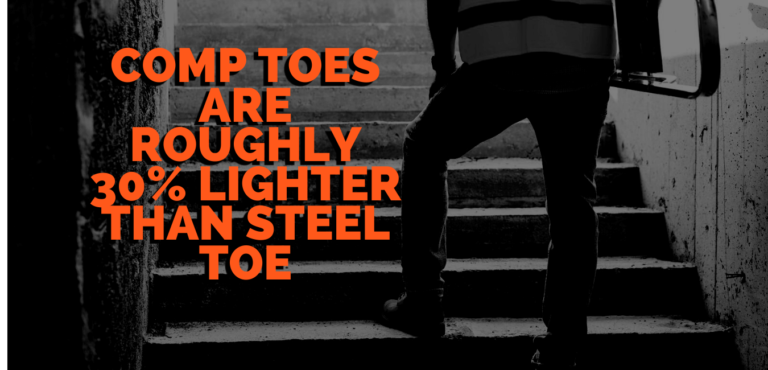
What Does OSHA say about steel toes for electricians?
Recommended Electrician Boots
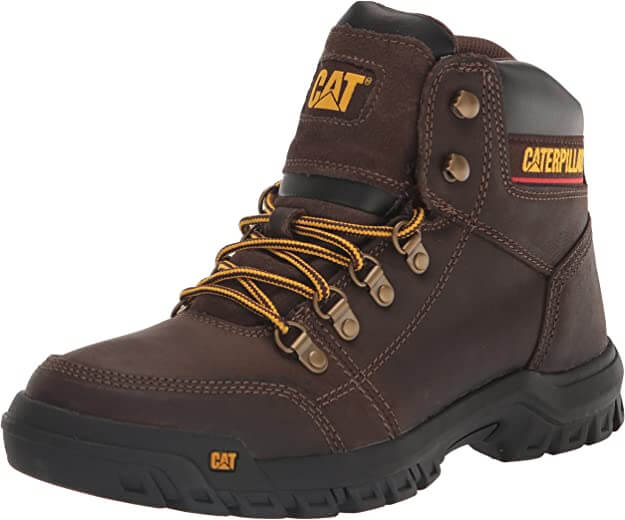
Lightweight
Very Comfortable
Leather
Oil and Slip Resistant
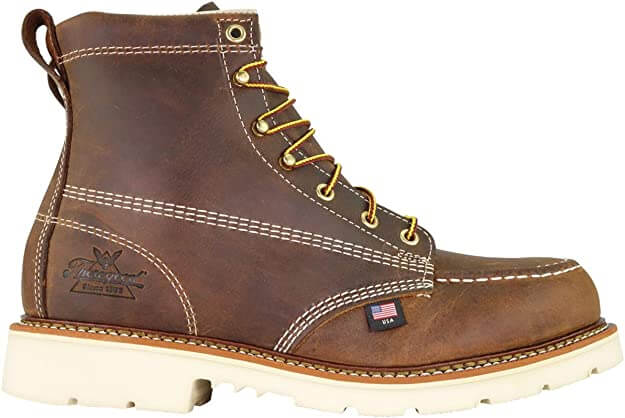
Genuine Leather
Great Outersole
Goodyear Welted
Oil and Slip Resistant
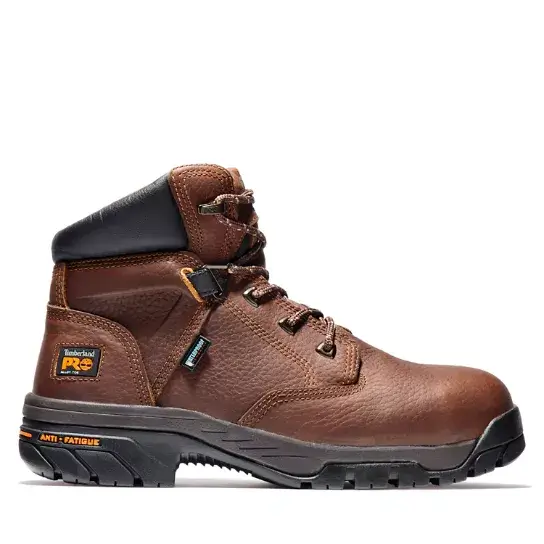
Extremely Comfortable
Waterproof
Very Durable
Slip and Oil Resistant
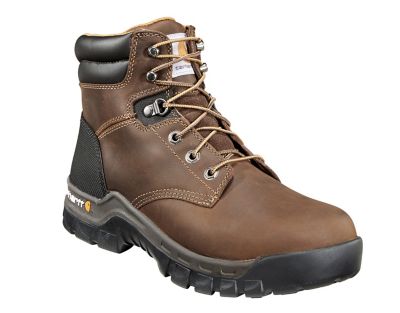
Lightweight
Slip Resistant
Genuine Leather
Comfortable
What Kind Of Boots Should Electricians Wear?

Electricians need boots that are durable, comfortable, and safe. When it comes to safety features, safety toe boots have long been the industry standard for electricians which does include both steel toes and composite toes.
Key Features to Look For in Saftey Toe Boots:
- Electrical Hazard Rated (EH)– Most boots now come electrical hazard rated but you need to make sure the ones you purchase are indeed Electrical Hazard
- ASTM Rated – ASTM ratings for boots typically refer to their ability to protect the wearer from specific hazards, such as electrical hazards, impact resistance, and slip resistance. For example, ASTM F2413-11 is the standard specification for performance requirements for protective (safety) toe cap footwear, and boots with this rating have been tested for impact resistance, compression resistance, and metatarsal protection.
- Heel Type – not all employers have the same boot requirements. It’s important to know what is required at your job site as many require a defined heel on work boots. That means no flat-soled work boots, only those with an actual heel.
- Defined-heel boots are the standard although you may be able to use flat-soled boots depending on your job site.
- Ankle Support – Electricians go up and down ladders, and stairs, and do extensive amounts of walking, crouching, and other physically demanding movements. Ankle support is critical to prevent injury and overall comfort. Lace-ups tend to provide the most ankle support as well as pull-on boots.
- Lace-ups provide the most ankle support
- Waterproof – depending on the job and work conditions it may be vital for your boots to be waterproof or have the ability to be waterproofed. It is best to keep the worst working conditions you could encounter in mind when choosing your next work boot as those are the days that will be the most miserable. If you have the chance to be in water it would be in your best interest to get waterproof or leather workboots.
- Quality Materials – Leather is always a material I recommend for any work boots as it is very durable and can be waterproofed. You’ll also want to take note of the fabric materials both on the exterior of the boot and the interior. Interior fabric will make your feet hotter than those without it. Fabric on the outside of work boots tends to soak water and can make your socks wet if the boot isn’t waterproof and has a higher chance of tearing.
- Preferable materials: Leather, little to no fabric, no fabric on the interior of the boot unless you’re in cold conditions
- Weight – boots do not weigh the same at all. Choosing a boot that is lightweight means less fatigue on your body as you’re climbing ladders, stairs, crouching, or walking miles at a time.
- Comfort – Comfort is huge as you’ll be using these boots day in and day out. Of course, there are ways to modify the comfort of your boots like stretching them or replacing the insole but you should aim for at least a base level of comfort when purchasing. That means they shouldn’t cause you pain before you have the chance to break them in at the bare minimum.
- Outersole – the outer sole is what is in direct contact with the ground as you walk. Buying a boot that cannot handle walking on metal grate stairs, concrete, gravel, getting wet frequently, or just isn’t durable pretty much makes the boots not effective for electricians. Make sure the boots you’re purchasing have a good outer sole.
- Toe Cap Material – I recommend using composite toe work boots for electricians mainly because of the added benefit that the toe cap won’t be conductive at all. They’re also lighter and don’t conduct heat or cold like steel does which means a more comfortable boot in the long run.
- Composite-toe boots are preferable but steel toes are also very good
When considering steel toe vs composite toe boots, there are many factors to consider. Steel toes are usually heavier than composite toes, which can be beneficial in terms of druability (can handle multiple heavy compressions), but they may not fit as comfortably due to their weight and bulkiness. Composite toe boots offer superior shock absorption / non-conductive properties while still providing adequate protection from falling objects and debris.
No matter what kind of boot you choose, it’s important to make sure it fits properly and is made of quality materials so it will last over time. With all these options available, electricians should take some time to research the pros and cons before making a purchase decision. This way they’ll know exactly what type of boot best suits their needs. With this information in hand, electricians can confidently move onto understanding the specifics of composite toe pros and cons for them personally.
Composite Toe Pros And Cons Electricians
When it comes to safety footwear for electricians, composite toe boots are a great option and in my opinion the best option. They offer the same level of protection as steel toes but without the extra weight, bulkiness, or heat transfer.
Composite safety shoes are also non-metallic, so they won’t set off metal detectors at job sites which is an important feature for many electricians who need to be able to access restricted areas.
Pros:
- Lightweight – 30% lighter than steel toes
- Less Heat Conductive – won’t transfer heat or cold to your feet as much as steel toes
- Nonconductive – won’t conduct electricity
Cons:
- Doesn’t handle compression as well as steel toes – after a heavy object or large force hits the toe caps the cap may be compromised
- Less Options – steel toe boots have been around longer and have more options to choose from
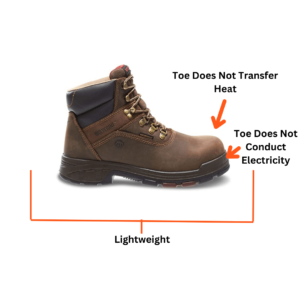
Composite-toe shoes have some benefits over traditional steel-toe boots in terms of their lightness and flexibility; however, this type of boot does not provide the same level of impact protection from heavy objects that steel toes do.
While composite toe boots may protect your feet from most everyday workplace hazards, you should consider wearing steel-toes if you work in hazardous environments where there is a higher risk of falling or crushing objects.
Reason being that once a large force, such as a very heavy falling object, lands on a composite toe the toe cap then may be compromised without your knowledge. So the next time something heavy goes over your toe area you’re effectively left defenseless.
Whether you choose composite or steel-toe boots depends largely on your needs as an electrician – both types offer good levels of protection although each has different strengths and weaknesses depending on the environment in which you work.
Moving onto another topic: let’s explore steel toe pros and cons for electricians.
Steel Toe Pros And Cons Electricians
For electricians, the choice between steel toe and composite toe boots can be a tough one. On one hand, there’s the heeled boot of steel-toe work shoes that offers protection from heavy objects and hazards in industrial settings; on the other you’ve got composite-toe boots that won’t conduct electricity and are much lighter. It’s important to weigh both options carefully when deciding what kind of footwear is best for your job.
When it comes to durability, steel-toe shoes are definitely top contenders. Steel toes protect against most physical impacts, you’re less at risk of your boots being compromised if a falling object falls on your steel toe. Plus, their sturdiness means these work boots last longer than many others — an electrician who needs reliable safety shoes will certainly appreciate this quality.
Pros:
- Protection – Can handle more than one heavy object falling on the toe cap or large force on the toe cap without being compromised
- More choices on the market
Cons:
- Heavy
- Conduct heat

Composite toes may not offer as much impact resistance as steel toes do, but they have one big advantage: electrical insulation. The material used in these boots doesn’t conduct electricity like metal does, so wearing them greatly reduces the risk of electrocution while working with wires and circuits. And since they tend to be lighter than steel toe alternatives, some workers might find them more comfortable too!
So if your main concern when choosing protective footwear is staying safe around live wires, then composite toe boots would make a sensible choice for any electrician who wants to stay protected without compromising comfort.
Are Steel Toe Boots Conductive?
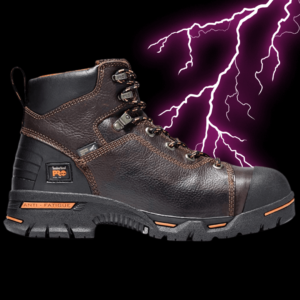
The answer to whether steel-toe boots are conductive or not is not as straightforward as a simple yes or no. It depends on the design and whether the boots have become compromised.
Steel is a good conductor of electricity, and if a steel toe cap in a boot comes in direct contact with an electrical source, the current can flow through the metal and into the wearer’s foot, causing electric shocks or burns. This is especially dangerous for electricians and linemen.
However, steel toe boots are designed with safety requirements in mind and incorporate measures to prevent electrical conductivity. The steel toe cap is enclosed in a nonconductive material like rubber or leather, which insulates the metal from electrical currents. As long as the steel toe cap remains enclosed and does not come in direct contact with the foot or electrical sources, the steel toe boots will not be conductive.
So, to answer the question, steel toe boots are made to be non-conductive but if the steel toe cap is exposed you can be at risk for injury. It is crucial to choose a pair of boots that are specifically designed for the work environment and hazards associated with the job. For workers in electrical industries, non-conductive steel toe boots are a must-have to protect against electrical shocks and other hazards.
What Are The Risks Of Steel Toe Shoes For Electricians?
Steel toe footwear is a must-have for people who work in hazardous environments, like electricians. However, these shoes come with certain risks that should be taken into consideration. Firstly, steel can conduct electricity if the boot is compromised, making it unsafe to wear in electrical resistance environments. While they are durable and long-lasting compared to composite safety toe boots, they are heavy which can lead to fatigue over time.
Do Safety Toe Boots Count As PPE?

Yes, safety toe boots, both steel toe and composite toe boots, are PPE. PPE – personal protective equipment refers to any equipment or clothing designed to protect the wearer from potential hazards in the workplace or in other environments.
It’s important to know that when electricians are looking for the right type of boot, they need to make sure it meets their job requirements and is up to standard with industry regulations. Safety toe boots do indeed qualify as a form of PPE because they provide extra protection against potential hazards in the workplace. For example, composite toes offer superior protection from puncture wounds and electrical shocks compared to non-safety toe boots.
It’s also worth noting that some employers may require workers to wear certain types of safety toe boots such as those made with metatarsal guards or other features designed specifically for their workplace. Always make sure you check with your employer first before purchasing any kind of work boot! This will ensure you get the best possible level of protection while on the job.
When it comes to choosing between safety toe boots and other forms of footwear, there is no one-size-fits-all solution. Weighing up factors such as cost, comfort, weight, fit, and durability can help you find the perfect pair for your needs – something that should be considered by all electricians who take pride in their profession. So don’t forget to take these into account when shopping around for the best manufacturers for work boots for electricians!
Best Manufacturers For Work Boots For Electricians

When it comes to finding the right work boots for electricians, there are many brands to choose from. However, some stand out above the rest for their durability, safety features, comfort, and overall quality.
Wolverine is a trusted brand that has been producing work boots for over a century. Their boots are known for their spectacular quality and durability. There are a few of these boots on my top 10 electrician work boots list because they hold up so well for the day to day of electricians. Wolverine has a variety of options including steel toe and composite toe.
Best Wolverine Boots for Electricians
See a curated list of the best Wolverine boots for electricians here!
See ListJustin is another brand that has been around for over 100 years and is known for its exceptional craftsmanship and comfort. Justin work boots are very stylish meaning they look so good you’ll often forget you’re wearing a work boot. Justin offers a variety of composite and steel toe options, although they are mainly known for their pull on cowboy style of boots.
Thorogood is a great brand, their boots are 100% made in America and they are known for that USA made quality. Their work boots are known to have set the trend within the work boot world of a white sole and the higher quality leather. You’ll often see other brands mimicking the Thorogood style boots. The only down side for Thorogood boots is that they tend to be more expensive, although you’re getting the made in the USA quality.
Best Thoroood Boots for Electricians
See a curated list of the best Thorogood boots for electricians here!
See ListAriat is a respected brand that is known for its innovative features and advanced technology. Their work boots are known to blend durability with just looking absolutely great. Ariat has many steel and composite toe work boots that are great for electricians.
Timberland is my favorite brand for work boots. They tend to last just as long as any of the other brands mentioned but they are also some of the most comfortable boots on the market. Often times you’ll need to replace the insole of the other brands because it is so thin you’ll wear it out before the boot needs to be replaced. Timberland includes their high quality insoles within their boots, without the hassel of having to make a seperate purchase just so your feet are comfortable.
CAT is a globally recognized brand and they make great work boots. They are mainly known for providing a decent work boot for a fair price. You’ll often see CAT work boots priced lower than some brands but their durability punches above the price.
Durango is one of my favorite work boot brands for any profession, not just electricians. Durango has a outer sole that is lighter weight than any other boot sole I’ve seen. You feel as though you’re wearing tennis shoes and that is not an exaggeration. The boots are light as can be and are very comfortable at that.
I’ve created a master list of the best work boots for electricians if you want specific recommendations with explanations for why they are great.
Best Styles of Boots for electricians

There are many different types of boot styles that electricians can wear day to day. Remember the most important aspects of any work boot is that it meets safety standards, is made of high quality materials, can withstand heavy impacts, and that you’re purchasing a comfortable work boot.
Pull-on boots are a quick and convenient choice for electricians who need a comfortable work boot that is easy to put on and take off and don’t want the hassel of tying shoe laces.
They’re perfect for electricians who need to move from one job site to another throughout the day, depending on the style they can be some of the most durable boots on the market, and in most cases can be made waterproof. For electricians who need to work in extreme weather conditions, waterproof boots are a must-have. Pull ons are one of the best choices for those electricians who need waterproof boots.
Lace-up boots, on the other hand, provide a secure and snug fit and superior ankle support, making them an ideal option for electricians who require stability while working on uneven surfaces or at heights. Lace ups provide the best ankle support which is why they are my favorite protective boots for electricians as you’ll often be going up and down ladders, stairs, and in general doing an excessive amount of walking. Lace-ups also make for a very comfortable work boot choice as you can adjust the tightness whereas with pull-ons or slip ons you cannot.
Chelsea style work boots are a blend between the lace-up and the pull-on. Chelsea boots tend to go just as high as lace-up boots, roughly 6 inches, but do not have laces so you get the benefit of easy on and easy off. While the chelsea style boot is fairly new to the work boot scene there are many options both in composite boots and steel toe boots.
How Much Weight Can A Composite Toe Vs. Steel Toe Handle?
Conclusion
Well, as a former work boots salesman, I can say that I’ve seen it all when it comes to composite toe boots and steel toe boots. Both types of shoes have their advantages and disadvantages for electricians, but after careful consideration, my final verdict is this: Composite toe boot are the best choice for electricians. They provide excellent protection from potential hazards without sacrificing comfort or durability – something that you won’t find in traditional steel toe boots. Plus, they’re lightweight and waterproof, so your feet will stay dry even during long days on the job site. All things considered, if you’re an electrician looking for a safe yet comfortable pair of work boots, then composite toe boots are definitely worth considering!
